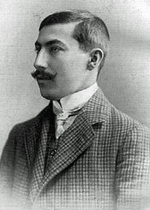Rubinstein Akiba (12.12.1882 – 14.03.1961)
 Polish-born Grandmaster (1950) who became Belgian in 1940, a world-class player who had never had a chance to play for the world title. Moved to Belgium before World War II but was interred in a sanatorium near Brussels.
Polish-born Grandmaster (1950) who became Belgian in 1940, a world-class player who had never had a chance to play for the world title. Moved to Belgium before World War II but was interred in a sanatorium near Brussels.
The youngest of 12 children, he came from a poor, religious Jewish family, and it was expected as the family tradition required that he would become a rabbi. But while he was studying in the local yeshiva, he came across a chess book in Hebrew, and at the relatively late age of 16, became addicted. Rubinstein began to make a name for himself soon afterwards with a well-known win against Georg Salwe in Lodz in 1901, and in 1905 earned his master ranking with a shared first prize with Duras in the Bremen Hauptturnier, was first equal in Ostende in 1907, and first in Carlsbad in 1907 and in St. Petersburg in 1909.
His successes increased from year to year, and in 1912 he shocked the world by winning four major events: San Sebastian, Piestany, Breslau, and Vilnius. Rubinstein challenged then the world champion Emanuel Lasker to a match set for the autumn of 1914, assuming that Rubinstein could raise his share of the purse, but the lack of luck and the outbreak of World War I put his candidacy on hold for a long time.
After World War I, Rubinstein continued to play in tournaments with moderate success but he did not regain his former high level of play until he won the Vienna Tournament in 1922, ahead of Alexander Alekhine and Richard Reti, and won Meran in 1924 and Marienbad in 1925.
Handicapped by neurotic fixations (he often left the table so his presence wouldn’t disturb his opponent; the buzzing of a fly could force him to make poor moves; he never ate in public or shook hands for fear of germs), Rubinstein retired from chess in 1932, having earned little money over the course of his lifetime. He died in Belgium in 1961.



